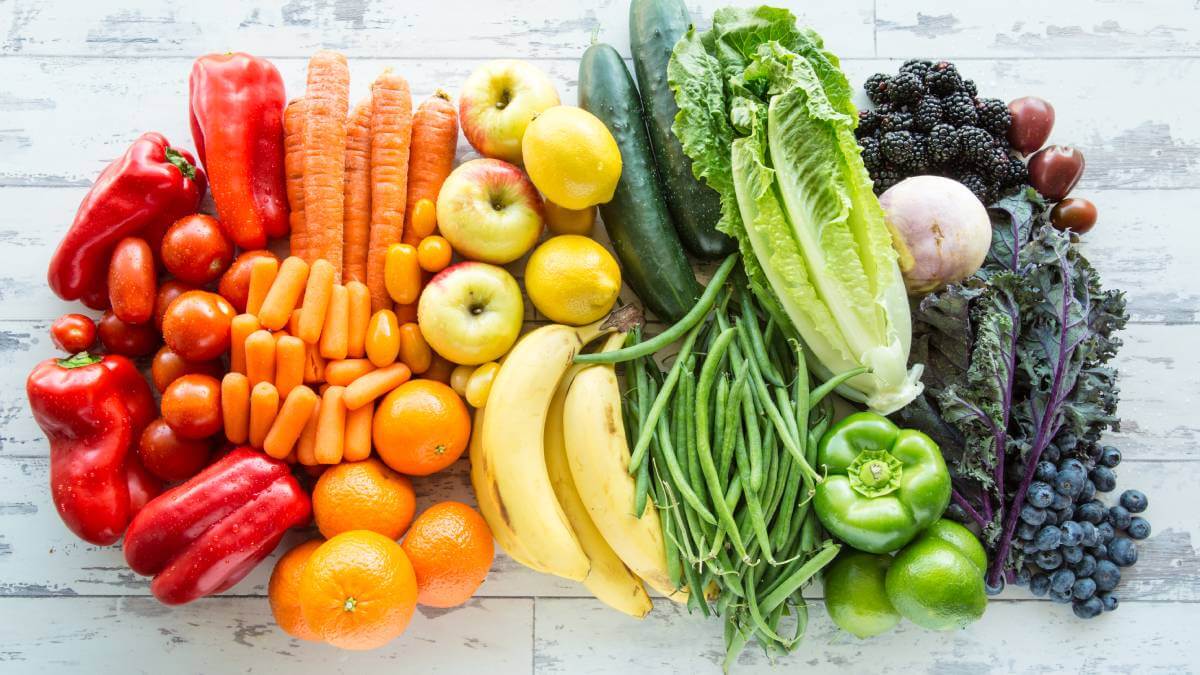Australia wastes more than 7.3 million tonnes of food each year.
If you are having trouble processing that, it’s the equivalent of 300kgs of food per person, per year. Yikes.
Wasting food not only contributes to landfill and wasted money, but it also leads to a significant amount of carbon emissions and wasted resources.
One simple habit to cut down on food waste is to use up your fruit and vegetables before they their ‘shelf life’ is up, but that is as varied as fruit and vegetables itself. However there are a few guidelines to help you get the best out of your fresh produce.
One of the biggest factors that affect the shelf life of fruits and vegetables is the type of produce itself, as well as the time spent in the supply chain, including storage and transport, from the moment it was picked.
Picked produce
Some families of fruits and vegetables naturally last longer, such as potatoes, apples, carrots, garlic, lemons, and oranges. When stored correctly, these varieties can be enjoyed for up to a month or even longer.
Others, such as corn and berries will only last a couple of days. In fact, corn is best eaten within hours of being picked as it harvested it steadily converts sugars into starches, giving it that chalky mouthfeel.
Most fruits found in supermarkets are harvested before they have fully ripened. While this is desirable for fruits such bananas and avocados, for the majority of fruits, it is not.
They are then stored at very low temperatures with low oxygen levels to halt the ripening process. However, once they are stocked on supermarket shelves at room temperature, the ripening process occurs rapidly.
Many fruits are also sprayed with a gas called ethylene when they are harvested. This gas delays the natural ripening process, allowing supermarkets to transport and store the fruit before putting it on the shelves. That’s why ripening happens so quickly once you bring the produce home.
| Fruit | Pantry | Fridge |
| Apples | 4 days | 1 month |
| Avocados | 3 days | 3 days |
| Bananas | 7 days if green, 2-4 days if ripe | Do not refrigerate |
| Berries | Not recommended | 2-3 days |
| Citrus | 1-2 weeks | 2 weeks + |
| Grapes | 3-5 days | Not recommended |
| Kiwi fruit | 2-3 days to ripen | 1 week once ripe |
| Melons | 2-3 days | 1 week |
| Peaches | 1 day to ripen | 3 days once ripe |
| Pears | 2 days to ripen | 2 weeks once ripe |
| Pineapple | 2 days (whole pineapple) | 1 week once cut |
| Strawberries | Not recommended | 3 days if covered |
| Watermelon | 2-3 days | 6-8 days |
| Vegetable | Pantry | Fridge |
| Asparagus | Not recommended | 3-5 days |
| Beans | Not recommended | 3-6 days |
| Broccoli | Not recommended | 5-7 days |
| Cabbage | Not recommended | 1-2 months |
| Carrots | Not recommended | 1-2 months |
| Capsicum | Not recommended | 1-2 weeks |
| Cauliflower | Not recommended | 1-2 weeks |
| Celery | Not recommended | 3-4 weeks |
| Corn | Not recommended | 3 days |
| Cucumber | Not recommended | 10-12 days |
| Eggplants | Not recommended | 10-12 days |
| Lettuce | Not recommended | 10-12 days |
| Mushrooms | Not recommended | 10-12 days |
| Onions | 1-3 months | 1-3 months |
| Peas | Not recommended | 5-6 days |
| Potatoes | 2-4 months | Not recommended |
| Tomatoes | 2-5 weeks to ripen | 5-7 days |
It’s also crucial to be aware of the shelf life and expiry date of the food in your fridge.
The expiry date is the date listed by the manufacturer that indicates how long a product will remain good if unopened.
For highly perishable foods such as meat and dairy products, this is called a ‘use-by date’, while foods that stay better in storage have a ‘best before’ date.
Shelf life, on the other hand, refers to the length of time that products can be stored without becoming unfit for consumption.
Factors such as microbiological changes, moisture and water vapour transfer, chemical or biochemical changes, food-packaging interaction, and domestic storage all influence the shelf life of food.
Do you have trouble keeping food fresh? What are your best tips? Why not share them in the comments section below?


If you are concerned about food waste and saving money, you must try The Swag bag!
https://www.theswag.com.au/
I discovered these several years ago and they are just magic! An Aussie invention, they are fabric bags designed to store fresh produce in your fridge – fresher for much longer! I keep recommending them to friends!
You simply dampen them before use: “The Swag protects your fruit & veggies by preserving the water within the middle layer from drying out too quickly.”